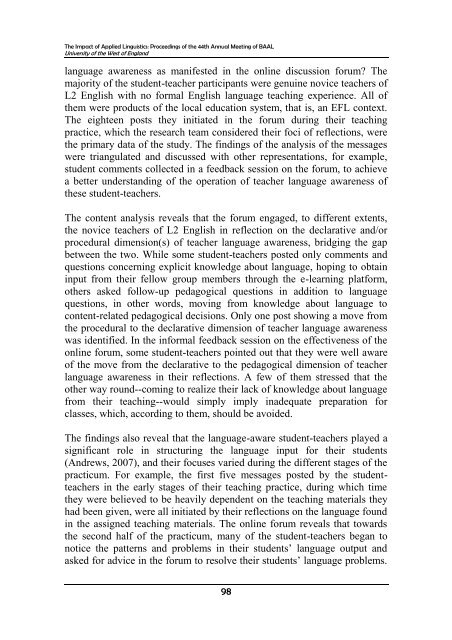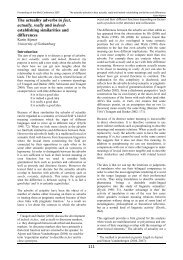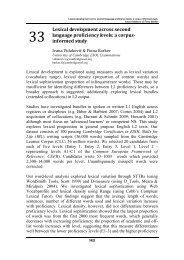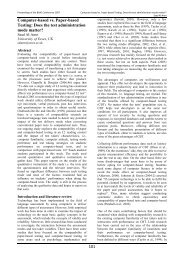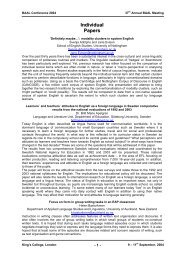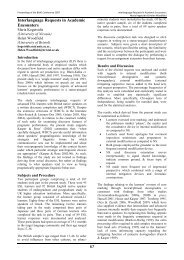Proceedings of the - British Association for Applied Linguistics
Proceedings of the - British Association for Applied Linguistics
Proceedings of the - British Association for Applied Linguistics
Create successful ePaper yourself
Turn your PDF publications into a flip-book with our unique Google optimized e-Paper software.
The Impact <strong>of</strong> <strong>Applied</strong> <strong>Linguistics</strong>: <strong>Proceedings</strong> <strong>of</strong> <strong>the</strong> 44th Annual Meeting <strong>of</strong> BAAL<br />
University <strong>of</strong> <strong>the</strong> West <strong>of</strong> England<br />
language awareness as manifested in <strong>the</strong> online discussion <strong>for</strong>um? The<br />
majority <strong>of</strong> <strong>the</strong> student-teacher participants were genuine novice teachers <strong>of</strong><br />
L2 English with no <strong>for</strong>mal English language teaching experience. All <strong>of</strong><br />
<strong>the</strong>m were products <strong>of</strong> <strong>the</strong> local education system, that is, an EFL context.<br />
The eighteen posts <strong>the</strong>y initiated in <strong>the</strong> <strong>for</strong>um during <strong>the</strong>ir teaching<br />
practice, which <strong>the</strong> research team considered <strong>the</strong>ir foci <strong>of</strong> reflections, were<br />
<strong>the</strong> primary data <strong>of</strong> <strong>the</strong> study. The findings <strong>of</strong> <strong>the</strong> analysis <strong>of</strong> <strong>the</strong> messages<br />
were triangulated and discussed with o<strong>the</strong>r representations, <strong>for</strong> example,<br />
student comments collected in a feedback session on <strong>the</strong> <strong>for</strong>um, to achieve<br />
a better understanding <strong>of</strong> <strong>the</strong> operation <strong>of</strong> teacher language awareness <strong>of</strong><br />
<strong>the</strong>se student-teachers.<br />
The content analysis reveals that <strong>the</strong> <strong>for</strong>um engaged, to different extents,<br />
<strong>the</strong> novice teachers <strong>of</strong> L2 English in reflection on <strong>the</strong> declarative and/or<br />
procedural dimension(s) <strong>of</strong> teacher language awareness, bridging <strong>the</strong> gap<br />
between <strong>the</strong> two. While some student-teachers posted only comments and<br />
questions concerning explicit knowledge about language, hoping to obtain<br />
input from <strong>the</strong>ir fellow group members through <strong>the</strong> e-learning plat<strong>for</strong>m,<br />
o<strong>the</strong>rs asked follow-up pedagogical questions in addition to language<br />
questions, in o<strong>the</strong>r words, moving from knowledge about language to<br />
content-related pedagogical decisions. Only one post showing a move from<br />
<strong>the</strong> procedural to <strong>the</strong> declarative dimension <strong>of</strong> teacher language awareness<br />
was identified. In <strong>the</strong> in<strong>for</strong>mal feedback session on <strong>the</strong> effectiveness <strong>of</strong> <strong>the</strong><br />
online <strong>for</strong>um, some student-teachers pointed out that <strong>the</strong>y were well aware<br />
<strong>of</strong> <strong>the</strong> move from <strong>the</strong> declarative to <strong>the</strong> pedagogical dimension <strong>of</strong> teacher<br />
language awareness in <strong>the</strong>ir reflections. A few <strong>of</strong> <strong>the</strong>m stressed that <strong>the</strong><br />
o<strong>the</strong>r way round--coming to realize <strong>the</strong>ir lack <strong>of</strong> knowledge about language<br />
from <strong>the</strong>ir teaching--would simply imply inadequate preparation <strong>for</strong><br />
classes, which, according to <strong>the</strong>m, should be avoided.<br />
The findings also reveal that <strong>the</strong> language-aware student-teachers played a<br />
significant role in structuring <strong>the</strong> language input <strong>for</strong> <strong>the</strong>ir students<br />
(Andrews, 2007), and <strong>the</strong>ir focuses varied during <strong>the</strong> different stages <strong>of</strong> <strong>the</strong><br />
practicum. For example, <strong>the</strong> first five messages posted by <strong>the</strong> studentteachers<br />
in <strong>the</strong> early stages <strong>of</strong> <strong>the</strong>ir teaching practice, during which time<br />
<strong>the</strong>y were believed to be heavily dependent on <strong>the</strong> teaching materials <strong>the</strong>y<br />
had been given, were all initiated by <strong>the</strong>ir reflections on <strong>the</strong> language found<br />
in <strong>the</strong> assigned teaching materials. The online <strong>for</strong>um reveals that towards<br />
<strong>the</strong> second half <strong>of</strong> <strong>the</strong> practicum, many <strong>of</strong> <strong>the</strong> student-teachers began to<br />
notice <strong>the</strong> patterns and problems in <strong>the</strong>ir students’ language output and<br />
asked <strong>for</strong> advice in <strong>the</strong> <strong>for</strong>um to resolve <strong>the</strong>ir students’ language problems.<br />
98


